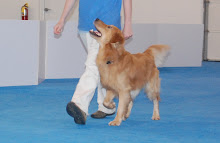 A point made all three days was that "Errors are your friends."
A point made all three days was that "Errors are your friends."If we go through our training and find errors in the performance, add it to the list of things to address. It's better for these to be made now rather than out in the real world or in the ring.
Dog's don't fail, they perform as trained, so we need to be sure that all intentional and unintentional training is directing them correctly. We need to be regularly accessing where we are and what our goal behavior is and how on-track our current behavior is.
And for those who are working with multiple dogs, but especially larger numbers in a professional/volunteer/student-dog situation, we can be looking at efficiency and over time our training plans and lessons should be geared to fewer overall errors. If we are seeing the same things come up again and again....our training plan is likely faulty.
An area my personal dogs are overall too poor with: Go to mat. Stay in place with duration. Recall. I have very efficient plans for some behaviors (walking, stay with distractions). But not so much for other behaviors. So I know to direct my time and energy to make these plans better and get better results for my dogs, student dogs, and the shelter dogs I work with.
Little errors should be addressed too. At the very least, to be consciously making a decision.
At the seminar, a few dogs were working on a targeting behavior to clean up the report/alert to a specific odor. The dogs were sometimes mouthing. The owner wanted a nose touch. We discussed the benefits and not of an open mouth and a closed mouth touch.... Initially the owner determined she didn't have a preference. But later that may have changed (I switched groups and didn't get to see more of that team).... as we realized the open mouth COULD lead to more likely grabs..... Little tiny things! They can be important!
I know that I obsessively track the errors in our training.... It's a step beyond the "We're marking the positive so that's primarily what we see", but we really do need to monitor errors so that we can train appropriately. Many instructors will do this for students, not necessarily pointing out the errors.
My technique for that in class... is to say "Now we are going to make it harder. Keep your hands behind your back/your leash hand at your waist/say nothing/some other incompatible or additional criterion for the human. " The students don't know the errors were happening or that I sometimes was internally cringing at the remote clicker hand or the accidental leash pulls. And they don't need to know. I don't want them to be feeling disappointed, even for a moment. The "now we make it harder" phrase gets them to think "More to master! More to accomplish! we succeeded at that step!". And it's a good way to avoid the horrible, "That was great, but..." phrases that can be quite punishing.




No comments:
Post a Comment